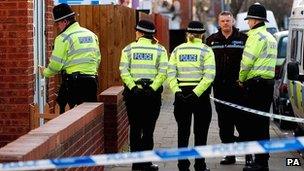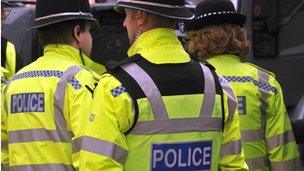Police and Crime Commissioners: who cares?
- Published
- comments

Elected police commissioners will determine strategies for reducing crime in their areas
Most people know next to nothing and care even less about the Police and Crime Commissioner elections on Thursday, 15 November 2012.
All the polling information suggests a very low turnout, possibly under 20%.
That's unless the television and radio advertising campaign now under way can engender some semblance of public awareness in a region comprising five of the 41 police force areas outside London where elections are being held.
The West Midlands force is the biggest outside the capital.
West Mercia straddles a vast geographical area covering the whole of Shropshire, Herefordshire and Worcestershire.
Our three 'shire county' forces are Gloucestershire, Warwickshire and Staffordshire.
They all have very distinct policing priorities which defy the sort of airy generalisations familiar in short blog posts like this.
So our BBC political reporters in each of the five force areas will be delving into the challenges facing each of them in this weekend's Sunday Politics West Midlands, external.
With me in the studio to try to dispel the general air of mystery and confusion surrounding the proceedings will be:
James Morris MP, Conservative, Halesowen and Rowley Regis;
Steve McCabe MP, Labour, Birmingham Selly Oak;
John Hemming MP, Liberal Democrat, Birmingham Yardley.
Powerful role?
Remember, the purpose of the shake-up is meant to be about raising the public profile of police accountability.
How could a commissioner claim a genuine mandate if they were elected by fewer than one in five?
Privately, ministers are very anxious about the possibility of a low turnout.
But publicly they tell us that voters will become more engaged once they realise this is their first big opportunity to have a direct say over how their communities are policed.
Which raises the question whether the commissioners really will be all that powerful or, as critics suggest, relatively powerless.
The formal levers at their disposal look impressive:
Ultimately, to hire and even fire the chief constable
To set the police budgets
To determine strategies for reducing crime
To engage with local communities.
Sceptics say all this flatters to deceive.
Operational responsibility for the day-to-day policing that matters most to people on the doorstep (crimes against the person, burglary and anti-social behaviour) remains with senior police officers headed by the chief constable.
So in practice it follows that the role of the commissioner will be more token than real.
Neither of these interpretations by itself tells the whole story.
Politics and policing
The real test of how much clout the PCCs will have is whether they make full use not just of their defined powers, but also of what politicians like to call the 'soft powers' - persuasion, bargaining, coaxing and cajoling, negotiating, forming alliances and brokering deals.

The new police commissioners will set police budgets in their force areas
Successful political leaders develop the habit of occupying the full space allowed them by their high office... and then some.
The converse can be equally and brutally true.
And remember this is about politics, whatever the merits or demerits of those pious hopes expressed early on that we would see an abundance of independent candidates aiming to 'keep politics out of policing'.
For good or ill, these contests were always bound to be political.
How else can you describe the paraphernalia surrounding nominations, the preparation of manifestos and mission statements, and ultimately the submission of candidates to the will of the electorate?
And who have the most experience, resources and expertise to manage this process? The political parties, of course.
So these elections were always going to be an uphill fight for independents, not least because of the £5,000 deposit to be staked by each candidate.
No wonder the names of recycled party politicians feature so prominently among the candidates.
Here's a full list of the candidates on the BBC Police Elections website.
The real point though, is that this is uncharted territory for us all. We have never been this way before.
A genuine novelty.
And my hunch is that by mid November, the excitement will no longer be confined to us political anoraks.
Find out more about the police commissioner debate on the BBC Sunday Politics West Midlands from 11.00 on BBC One on Sunday, 21 October 2012.